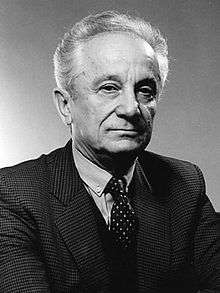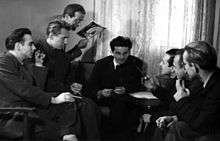Fadil Hadžić
| Fadil Hadžić | |
|---|---|
 | |
| Born |
23 April 1922 Bileća, Bosnia and Herzegovina |
| Died |
3 January 2011 (aged 88) Zagreb, Croatia |
| Occupation | Playwright, screenwriter, film director |
| Language | Bosnian language |
| Period | 1952–2008 |
Fadil Hadžić (23 April 1922 – 3 January 2011) was a Bosnian-Croatian film director, screenwriter, playwright and journalist, mainly known for his comedy films and plays. He was of Bosnian origin,[1] but mainly lived and worked in Croatia, and was well known in the former Yugoslavia.
Biography
Hadžić was born in Bileća in Bosnia and Herzegovina. He studied painting at the Academy of Fine Arts Zagreb and then went on to edit several popular magazines (Kerempuh, Vjesnik u srijedu, Telegram). He was also one of the founders of the prominent theatres Kerempuh (then called Jazavac) and Komedija in Zagreb, and also worked as the intendant at the Croatian National Theatre in Zagreb.[2]

He had his screenwriting debut in 1952 with the animated film The Haunted Castle at Dudinci (Croatian: Začarani dvorac u Dudincima), directed by Dušan Vukotić. In 1961 Hadžić had his directorial debut with Alphabet of Fear (Abeceda straha). He was a prolific and versatile filmmaker throughout the 1960s and his film Official Position (Službeni položaj) won the Big Golden Arena for Best Film at the 1964 Pula Film Festival. In the 1970s and 1980s his output was lower, but in spite of this he won the Golden Arena for Best Director for his 1979 film Journalist (Novinar).
Hadžić also wrote and directed the 1972 film, Lov na jelene, starring Boris Dvornik and the famous Bosnian singer Silvana Armenulić, a subversive thriller-drama about an emigrant suspected of Ustaša activity, which was timely and popular because of its relation to the Croatian Spring.[3]
In the early 1980s he effectively stopped making films, and turned to playwriting. In this period he wrote more than 57 popular plays and had 14 solo exhibitions of his paintings.[4] In the early 2000s he became active in film again, directing a couple of film adaptations of his comedy plays in 2003 and 2005, followed by the war drama Remember Vukovar (Zapamtite Vukovar) in 2008. He died in Zagreb.
References
- Notes
- ↑ Subversive Film Festival.
- ↑ "FILM.HR ::: Fadil Hadžić" (in Croatian). Film.hr. Retrieved 18 May 2010.
- ↑ Nenad Polimac (2011-01-05). "Portret autora/Fadil Hadžić: Bosanac koji je obilježio kulturni život Zagreba 20. stoljeća" (in Croatian). Retrieved 2012-11-19.
[...] na izmaku Hrvatskog proljeća potpisao je triler-dramu “Lov na jelene” o emigrantu koga sumnjiče za ustaštvo, koja će dospjeti na “crnu listu” nakon što je u zagrebačkim kinima skupila preko sto tisuća gledatelja, s razlogom, jer je bila najsubverzivnije ostvarenje toga razdoblja [...]
- ↑ Polimac, Nenad (16 October 2002). "Fadil Hadžić - zanemareni filmski klasik" [Fadil Hadžić - neglected film classic] (in Croatian). Nacional. Archived from the original on 3 July 2012. Retrieved 18 May 2010.
- Other sources
- "Druga strana medalje, Fadil Hadžić, 1965." (in Croatian). Subversive Film Festival. Retrieved 25 March 2015.
Further reading
- Pavičić, Jurica (June 2003). "Igrani filmovi Fadila Hadžića" (PDF). Hrvatski filmski ljetopis (in Croatian) (34): 3–38. Retrieved 12 November 2014.
- Radić, Damir (17 October 2002). "Portret redatelja: Fadil Hadžić". Vijenac (in Croatian) (225). Retrieved 11 July 2015.
External links
- Fadil Hadžić at the Internet Movie Database
- Fadil Hadžić biography at Film.hr (Croatian)
- http://www.jutarnji.hr/kerempuh--preminuo-hrvatski-komediograf-fadil-hadzic/915265/ (Croatian)